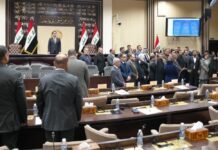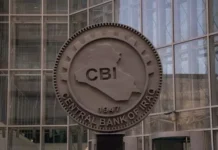There are serious accusations of corruption against the Speaker of the Iraqi Parliament, Muhammad al-Halbousi. However, the intensity of these accusations may not necessarily indicate his firm stance against corruption and his determination to hold the corrupt accountable, regardless of their positions in the state. Instead, these accusations might be seen as evidence of the intensification of his political differences with his opponents, suggesting that efforts to remove him from office have reached a crucial turning point.
The Speaker of the Iraqi Parliament, Muhammad al-Halbousi, is currently facing multiple allegations. These include his alleged involvement in financial corruption cases, illicit communication with foreign parties, collusion with Kuwait in the Khor Abdullah case, efforts to abolish the Accountability and Justice Law, and pushing for a general amnesty law in order to pardon those who have been accused of crimes and reintegrate them back into society. These are all political accusations.
Those who are close to Al-Halbousi claim that all the accusations made against him are baseless and only aimed at tarnishing his reputation due to his prominent position in the political realm. However, his opponents refute this claim and assert that the evidence against him is supported by documents and will be presented to the judiciary.
A few months ago, there were reports of a disagreement between the Speaker of the House of Representatives and the Prime Minister, Muhammad Shiaa al-Sudani, and the coordination framework behind his government. The disagreement arose due to the failure of the framework’s leaders to fulfill their promises to Al-Halbousi and his allies during the negotiations to form the government.
According to political sources, the Speaker of the House of Representatives made efforts to gather Sunni political figures and forces in order to establish a coordination framework against the framework composed of Shiite parties. The goal was to have the largest number of Sunnis possible in opposition to the Shiite parties.
Al-Halbousi disagreed with the Shiite coordination framework and tried to create a Sunni counter-coordination framework.
The inflation of Al-Halbousi’s wealth and that of his close associates has become a major focus, leading to lawsuits filed against him.
Haider Al-Mulla, who is a member of the Azm Alliance, has urged the Prime Minister and the Integrity Commission to investigate and reveal the source of the millions of dollars that the Speaker of Parliament spends on extravagant displays of wealth and his private planes that he uses for his trips.
Local media recently shared a document that revealed the Integrity Commission sent a letter to the Anti-Money Laundering and Combating the Financing of Terrorism Office. The letter requested information about Muhammad al-Halbousi and his two wives’ possession of real estate and bank accounts in both Jordan and Belarus.
The Speaker of the Iraqi Parliament was accused of embezzlement and bribery related to project funds and licenses in Anbar Governorate.
Al-Halbousi’s opponents claim he solidified his influence in his previous governorate by appointing his followers and relatives to important positions in various departments in Anbar.
On Monday, Iraqi media outlets affiliated with Shiite forces alleged that Al-Halbousi’s party was involved in a corruption case related to the Anbar Health Department. According to the reports, committees from the Integrity Commission have initiated an investigation into corruption files in the department, which include forgery and the illegal acquisition of large sums of money by leaders in the Taqadum Party headed by Muhammad al-Halbousi.
The Maalouma news website reported that the Integrity authority has initiated investigations into corruption at the Anbar Health Department, following confessions made by employees during their investigation. The confessions implicated their colleagues in the department for forging medical committee decisions and correspondence from the Martyrs Foundation, as well as stealing large quantities of medicines from the governorate’s health directorate. Furthermore, the investigation revealed a case of theft of bank instruments that were designated for the purchase of chronic disease medications.
The source has revealed that the majority of those involved in the corruption scandals are leaders and members of the ruling party in Anbar. This party is headed by the Speaker of the House of Representatives. It was reported that significant quantities of medicines had disappeared around a year ago, and nobody knows what happened to them. This has led to the integrity committees in Baghdad to investigate and prosecute those responsible for the corruption. They will be referred to the judiciary for further action.
Rafiq Al-Salhi Al-Halbousi, a member of the Iraqi Parliament, has urged for his financial asset details to be revealed. He emphasized the need to activate the “Where Did You Get This” law and suggested that the Speaker of the House of Representatives should be the first to apply the law to himself, being the head of the legislative authority.
The charges against Al-Halbousi extend beyond financial corruption to illegal contacts and collusion against Iraq’s interests.
Al-Halbousi faced backlash after meeting with President Erdogan in Turkey.
Al-Halbousi’s supporters claim the charges against him are baseless while his opponents assert the charges are backed by evidence.
The Al-Fatah Alliance, which is a part of the coordination framework, believes that the recent visit was part of a campaign led by the Speaker of the House of Representatives to gain support from other countries in the region to repeal the Accountability and Justice Law. The coalition fears that the law would allow former members of the Baath Party to return to power.
Ali Al-Fatlawi, a leader in the Al-Fatah Alliance, stated that Al-Halbousi used his official address to request support for his project of reintegrating Baathists into the political process by eliminating Article 25 of the Accountability and Justice Law.
It was observed that political factions demonized Al-Halbousi for his alleged betrayal of Iraq by colluding with Kuwait in the Khor Abdullah case, which pertains to sharing the sea port in the Arabian Gulf. Recently, the Iraqi judiciary cancelled an agreement with Kuwait regarding the sharing process.
Hussein Al-Karaawi, a member of the Rights Movement representing the Hezbollah Brigades in Iraq, has accused the Speaker of Parliament of colluding and receiving bribes to ignore the Khor Abdullah file. He claims that the silence of the Speaker of Parliament on this matter is at the expense of the Iraqi people’s interest.
Observers of the developments in the case of the Iraqi Speaker of Parliament believe that if his involvement in corruption is proven in court, it will unfortunately not be an isolated incident in a country that has lost hundreds of billions of dollars to the corruption of its ruling class. However, they do not absolve his opponents and stress that corruption cases are often selectively opened and used as weapons to settle scores and eliminate political rivals by others who are no less corrupt.





